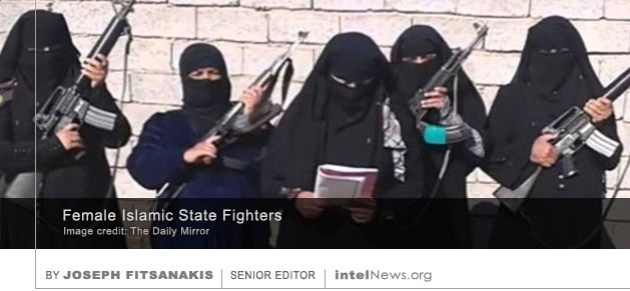Analysis: Women becoming growing force inside Islamic State, says expert
February 22, 2019 1 Comment
 The role of women inside the Islamic State is growing, as the Sunni militant group is transmuting into an underground organization, according to a Harvard University terrorism expert. Since its meteoric rise in Iraq and Syria, the Islamic State has been known for advocating for strict segregation between men and women. In the early stages of the group’s emergence, combat roles were exclusively performed by men, while women’s roles were limited to childbearing and housework. But according to Vera Mironova, Visiting Scholar in the Economics Department at Harvard University, and former Associate of the International Security Program at Harvard’s Belfer Center, the Islamic State’s policy on gender roles is shifting rapidly.
The role of women inside the Islamic State is growing, as the Sunni militant group is transmuting into an underground organization, according to a Harvard University terrorism expert. Since its meteoric rise in Iraq and Syria, the Islamic State has been known for advocating for strict segregation between men and women. In the early stages of the group’s emergence, combat roles were exclusively performed by men, while women’s roles were limited to childbearing and housework. But according to Vera Mironova, Visiting Scholar in the Economics Department at Harvard University, and former Associate of the International Security Program at Harvard’s Belfer Center, the Islamic State’s policy on gender roles is shifting rapidly.
Mironova, who has carried out research in Iraq while embedded with the country’s Special Operations Forces, argues that the Islamic State has been “quietly shifting its insistence of strict gender hierarchy” and is now “allowing, even celebrating, female participation in military roles”. In an article published earlier this week in The New York Times, Mironova states that early indications of this shift were visible as early as 2017. In October of that year, ISIS publications issued calls for “women to prepare for battle”. Within a year, the group was publicly praising its women fighters and even published a video showing veiled Islamic State female fighters firing AK-47 assault rifles. The video praised women fighters for “seeking revenge for [their] religion and for the honor of [their] sisters”.
In her article, the Harvard terrorism expert says that it is not possible to estimate with accuracy the number of women who have picked up arms on behalf of the Islamic State. But she adds that interviews with Iraqi military and police officials suggest that female Islamic State fighters are now “a regular presence that no longer surprises, as it did a few years ago”. There is a tradition of fervent women supporters of the militant group that dates from its very beginning, claims Mironova. She gives the example of female radicals who insisted that their husbands or sons join the Islamic State, or who sought to marry Islamic State combatants in order to be part of “mujahedeen families”. Recently, however, the relative scarcity of male fighters in the ranks of the militant group has led to calls for females to take their place in the front lines. As the Islamic State is transmuting into an underground organization, women are also becoming more useful as covert operatives because they attract less attention by Iraqi or Syrian government troops.
In many cases, women supporters of the Islamic State who lost male family members in the ongoing war pick up arms or put on suicide vests in order to extract revenge. In other cases they do in order to secure protection, favors or money for their families from the insurgents. The fact is, says Mironova, that women fighters are becoming more prominent in the Islamic State’s combat lines and are even participating in the group’s suicide bombing campaign. The latter continues unabated in Iraq and Syria, despite the near-complete loss of the Islamic State’s territorial control, says Mironova.
► Author: Joseph Fitsanakis | Date: 22 February 2019 | Permalink







Having done a university course on terrorism, a while back, it was surprising how many non-Muslim women on the course thought that women suicide bombers exhibited some sort of female empowerment. When I argued that it was leadership groups of Muslim men (under Sharia or other secular groupiings) who ordered suicide bomber women to their deaths I said the female bombers were being treated like cannon fodder https://www.merriam-webster.com/dictionary/cannon%20fodder .
My female university colleague were insufficiently steeped in realpolitik to know what cannon fodder meant. They were left to their feminist illusions of terrorism.